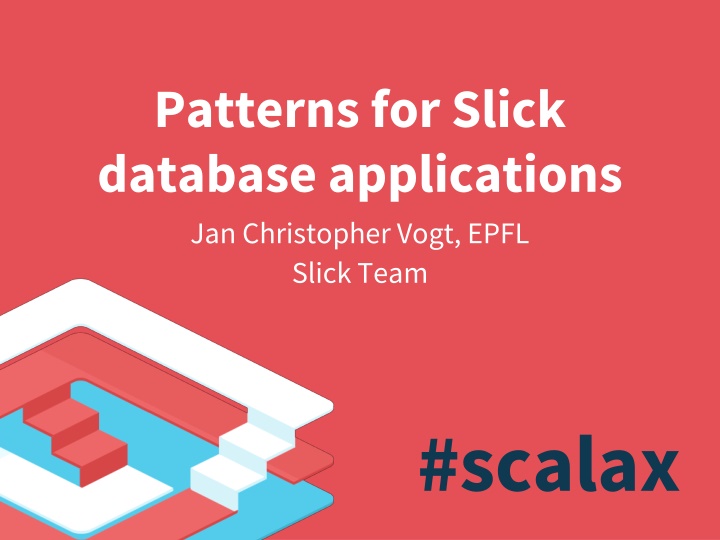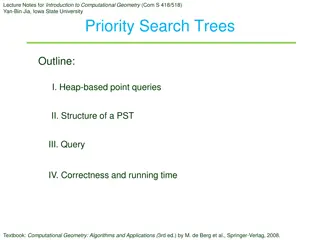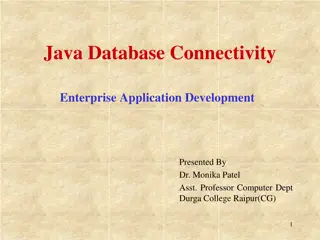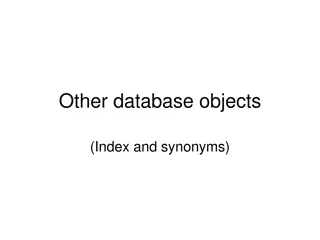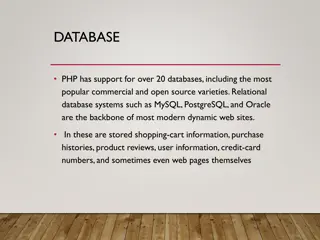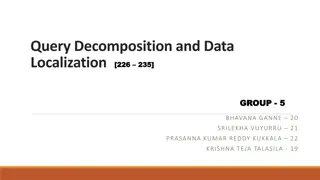Slick Database Applications and Query Composition
Dive into the world of Slick database applications with Jan Christopher Vogt and the EPFL Slick Team. Explore patterns, query composition, re-use, and desugaring in Scala for efficient database operations. Learn about dynamic queries, outer joins, and auto-increment code generation to streamline your database interactions using Slick 2.0. Discover how to eliminate boilerplate code and enhance your application using Slick's powerful features.
Download Presentation

Please find below an Image/Link to download the presentation.
The content on the website is provided AS IS for your information and personal use only. It may not be sold, licensed, or shared on other websites without obtaining consent from the author.If you encounter any issues during the download, it is possible that the publisher has removed the file from their server.
You are allowed to download the files provided on this website for personal or commercial use, subject to the condition that they are used lawfully. All files are the property of their respective owners.
The content on the website is provided AS IS for your information and personal use only. It may not be sold, licensed, or shared on other websites without obtaining consent from the author.
E N D
Presentation Transcript
Patterns for Slick database applications Jan Christopher Vogt, EPFL Slick Team #scalax
Recap: What is Slick? (for ( c <- coffees; if c.sales > 999 ) yield c.name).run select "COF_NAME" from "COFFEES" where "SALES" > 999
Agenda Query composition and re-use Getting rid of boiler plate in Slick 2.0 outer joins / auto joins auto increment code generation Dynamic Slick queries
Query composition and re-use
For-expression desugaring in Scala for ( c <- coffees; if c.sales > 999 ) yield c.name 999) coffees .withFilter(_.sales > .map(_.name)
Types in Slick class Coffees(tag: Tag) extends Table[C](tag,"COFFEES ) { def * = (name, supId, price, sales, total) <> ... val name = column[String]("COF_NAME", O.PrimaryKey) val supId = column[Int]("SUP_ID") val price = column[BigDecimal]("PRICE") val sales = column[Int]("SALES") val total = column[Int]("TOTAL") } lazyval coffees = TableQuery[Coffees] <: Query[Coffees,C] coffees.map(c => c.name) (coffees:TableQuery[Coffees,_]).map( (c:Coffees) => (c.name: Column[String]) ): Query[Column[String],String] ) (coffees ).map( (c ) => (c.name )
Table extensions class Coffees(tag: Tag) extends Table[C](tag,"COFFEES ) { val price = column[BigDecimal]("PRICE") val sales = column[Int]("SALES") defrevenue= price.asColumnOf[Double] * sales.asColumnOf[Double] } coffees.map(c => c.revenue)
Query extensions implicitclass QueryExtensions[T,E] ( val q: Query[T,E] ){ def page(no: Int, pageSize: Int = 10) : Query[T,E] = q.drop( (no-1)*pageSize ).take(pageSize) } suppliers.page(5) coffees.sortBy(_.name).page(5)
Query extensions by Table implicitclass CoffeesExtensions ( val q: Query[Coffees,C] ){ def byName( name: Column[String] ) : Query[Coffees,C] = q.filter(_.name === name).sortBy(_.name) } coffees.byName("ColumbianDecaf").page(5)
Query extensions for joins implicitclass CoffeesExtensions2( val q: Query[Coffees,C] ){ def withSuppliers (s: Query[Suppliers,S] = Tables.suppliers) : Query[(Coffees,Suppliers),(C,S)] = q.join(s).on(_.supId===_.id) def suppliers (s: Query[Suppliers, S] = Tables.suppliers) : Query[Suppliers, S] = q.withSuppliers(s).map(_._2) } coffees.withSuppliers() : Query[(Coffees,Suppliers),(C,S) coffees.withSuppliers( suppliers.filter(_.city === "Henderson") ) // buyable coffees coffeeShops.coffees().suppliers().withCoffees()
Query extensions by Interface trait HasSuppliers{ def supId: Column[Int] } class Coffees( ) extends Table... with HasSuppliers { } class CofInventory( ) extends Table... with HasSuppliers { } implicitclass HasSuppliersExtensions[T <: HasSupplier,E] ( val q: Query[T,E] ){ def bySupId(id: Column[Int]): Query[T,E] = q.filter( _.supId === id ) def withSuppliers (s: Query[Suppliers,S] = Tables.suppliers) : Query[(T,Suppliers),(E,S)] = q.join(s).on(_.supId===_.id) def suppliers ... } // available quantities of coffees cofInventory.withSuppliers() .map{ case (i,s) => i.quantity.asColumnOf[String] ++ " of " ++ i.cofName ++ " at " ++ s.name }
Query extensions summary Mindshift required! Think code, not monolithic query strings. Stay completely lazy! Keep Query[ ]s as long as you can. Re-use! Write query functions or extensions methods for shorter, better and DRY code.
Auto joins implicitclass QueryExtensions2[T,E] ( val q: Query[T,E] ){ def autoJoin[T2,E2] ( q2:Query[T2,E2] ) ( implicitcondition: (T,T2) => Column[Boolean] ) : Query[(T,T2),(E,E2)] = q.join(q2).on(condition) } implicitdefjoinCondition1 = (c:Coffees,s:Suppliers) => c.supId === s.id coffees.autoJoin( suppliers ) : Query[(Coffees,Suppliers),(C,S)] coffees.autoJoin( suppliers ).map(_._2).autoJoin(cofInventory)
Auto incrementing inserts val supplier = Supplier( 0, "Arabian Coffees Inc.", ... ) // now ignores auto-increment column suppliers.insert( supplier ) // includes auto-increment column suppliers.forceInsert( supplier )
Code generator for Slick code // runner for default config import scala.slick.meta.codegen.SourceCodeGenerator SourceCodeGenerator.main( Array( "scala.slick.driver.H2Driver", "org.h2.Driver", "jdbc:h2:mem:test", "src/main/scala/", // base src folder "demo" // package ) )
Generated code package demo object Tables extends { val profile = scala.slick.driver.H2Driver } with Tables trait Tables { val profile: scala.slick.driver.JdbcProfile import profile.simple._ caseclass CoffeeRow(name: String, supId: Int, ...) implicitdef GetCoffees = GetResult{r => CoffeeRow.tupled((r.<<, ... )) } class Coffees(tag: Tag) extends Table[CoffeeRow]( ){ } ...
Outer join limitation in Slick suppliers.leftJoin(coffees) .on(_.id === _.supId) .run // SlickException: Read NULL value ... id name name supId 1 Superior Coffee NULL NULL 2 Acme, Inc. Colombian 2 2 Acme, Inc. French_Roast 2 LEFT JOIN id name name supId 1 Superior Coffee Colombian 2 2 Acme, Inc. French_Roast 2
Outer join pattern suppliers.leftJoin(coffees) .on(_.id === _.supId) .map{ case(s,c) => (s,(c.name.?,c.supId.?, )) } .run .map{ case (s,c) => (s,c._1.map(_ => Coffee(c._1.get,c._2.get, ))) } // Generated outer join helper suppliers.leftJoin(coffees) .on(_.id === _.supId) .map{ case(s,c) => (s,c.?) } .run
CUSTOMIZABLE CODE GENERATION
Using code generator as a library val metaModel = db.withSession{ implicit session => profile.metaModel // e.g. H2Driver.metaModel } import scala.slick.meta.codegen.SourceCodeGenerator val codegen = new SourceCodeGenerator(metaModel){ // <- customize here } codegen.writeToFile( profile = "scala.slick.driver.H2Driver , folder = "src/main/scala/", pkg = "demo", container = "Tables", fileName="Tables.scala" )
Adjust name mapping import scala.slick.util.StringExtensions._ val codegen = new SourceCodeGenerator(metaModel){ overridedef tableName = _.toLowerCase.toCamelCase overridedef entityName = tableName(_).dropRight(1) }
Generate auto-join conditions 1 class CustomizedCodeGenerator(metaModel: Model) extends SourceCodeGenerator(metaModel){ overridedef code = { super.code + "\n\n" + s""" /** implicit join conditions for auto joins */ object AutoJoins{ ${indent(joins.mkString("\n"))} } """.trim() }
Generate auto-join conditions 2 val joins = tables.flatMap( _.foreignKeys.map{ foreignKey => import foreignKey._ val fkt = referencingTable.tableClassName val pkt = referencedTable.tableClassName val columns = referencingColumns.map(_.name) zip referencedColumns.map(_.name) s"implicit def autojoin${name.capitalize} "+ " = (left:${fkt},right:${pkt}) => " + columns.map{ case (lcol,rcol) => "left."+lcol + " === " + "right."+rcol }.mkString(" && ") }
Other uses of Slick code generation Glue code (Play, etc.) n-n join code Migrating databases (warning: types change) (generate from MySQL, create in Postgres) Generate repetitive regarding data model (aka model driven software engineering) Generate DDL for external model
Use code generation wisely Don t loose language-level abstraction Add your generator and data model to version control Complete but new and therefor experimental in Slick
Common use case for web apps Dynamically decide displayed columns filter conditions sort columns / order
Dynamic column class Coffees(tag: Tag) extends Table[CoffeeRow]( ){ val name = column[String]("COF_NAME", ) } coffees.map(c => c.name) coffees.map(c => c.column[String]("COF_NAME") ) Be careful about security!
Example: sortDynamic suppliers.sortDynamic("street.desc,city.desc")
sortDynamic 1 implicitclass QueryExtensions3[E,T<: Table[E]] ( val query: Query[T,E] ){ def sortDynamic(sortString: String) : Query[T,E] = { // split string into useful pieces val sortKeys = sortString.split(',').toList.map( _.split('.').map(_.toUpperCase).toList ) sortDynamicImpl(sortKeys) } privatedef sortDynamicImpl(sortKeys: List[Seq[String]]) = ??? } suppliers.sortDynamic("street.desc,city.desc")
sortDynamic 2 ... privatedef sortDynamicImpl(sortKeys: List[Seq[String]]) : Query[T,E] = { sortKeys match { case key :: tail => sortDynamicImpl( tail ).sortBy( table => key match { case name :: Nil => table.column[String](name).asc case name :: "ASC" :: Nil => table.column[String](name).asc case name :: "DESC" :: Nil => table.column[String](name).desc case o => thrownew Exception("invalid sorting key: "+o) } ) case Nil => query } } } suppliers.sortDynamic("street.desc,city.desc")
Summary Query composition and re-use Getting rid of boiler plate in Slick 2.0 outer joins / auto joins auto increment code generation Dynamic Slick queries
Thank you #scalax slick.typesafe.com @cvogt http://slick.typesafe.com/talks/ https://github.com/cvogt/slick-presentation/tree/scala-exchange-2013
filterDynamic coffees.filterDynamic("COF_NAME like Decaf")
